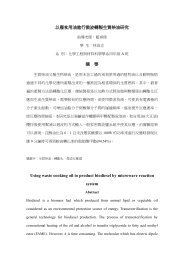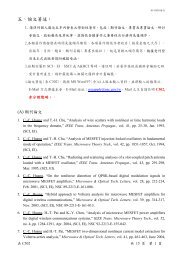å¼µåä¿® å士 Jo-Shu Chang
å¼µåä¿® å士 Jo-Shu Chang
å¼µåä¿® å士 Jo-Shu Chang
Create successful ePaper yourself
Turn your PDF publications into a flip-book with our unique Google optimized e-Paper software.
Bioenergy Engineering – Transforming biochemical engineering toward<br />
clean and sustainable energy production<br />
<strong>Jo</strong>-<strong>Shu</strong> <strong>Chang</strong> ( 張 嘉 修 )<br />
Department of Chemical Engineering<br />
National Cheng Kung University<br />
Tainan 701, Taiwan<br />
Fax: 06-2357146 E-mail: changjs@mail.ncku.edu.tw<br />
Abstract<br />
Our economy and lifestyle heavily rely on the use of major energy source - fossil fuels.<br />
However, the excessive dependence on fossil fuels has caused severe problems due to a seemly<br />
unstoppable rising of their cost, insecurity in their sustainability, as well as their impacts on<br />
global warming and environmental pollution. As a result, technologies leading to generation of<br />
reliable, efficient, and eco-friendly energy have received increasingly attention in recent years.<br />
Energy produced from biomass resources (esp., lignocellulosic materials) has the nature of<br />
CO 2 neutral and recycle of renewable resources, thereby becoming the most promising<br />
alternative to fossil fuels. Biomass energy produced from biological (mainly, fermentation)<br />
means is of particular interest since it is environmentally compatible and less energy intensive.<br />
Hence, many R&D efforts are devoted to biotechnology and bioengineering enabling<br />
conversion of biomass feedstock into gaseous (e.g., H 2 , CH 4 ) and liquid (e.g., ethanol, butanol,<br />
and biodiesel) energy products. This emerging technology requires integration of<br />
interdisciplinary knowledge and has attracted tremendous research momentum within a very<br />
short period of time. This presentation introduces recent advances on bioenergy development<br />
and the technology/engineering that are involved in producing biomass energy. Some<br />
specific examples are given to demonstrate how conventional and innovative biochemical<br />
engineering strategies can be utilized to develop leading edge energy technology or to improve<br />
the performance of existing biomass energy production technology. The aim of this<br />
presentation is to deliver the message that it is now a golden opportunity to open a new era of<br />
biochemical engineering as it can play a pivotal role in future energy development for the<br />
twentieth century.<br />
Keywords: biochemical engineering, biomass energy, carbon dioxide emission, fossil fuels,<br />
lignocellulosic materials, hydrogen, methane, bioethanol, biobutanol, biodiesel













